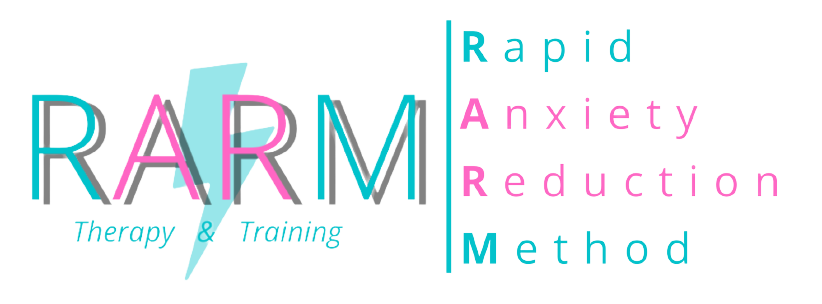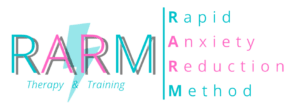
Research is key to continual evolvement
RARM – ACRJournal 2023
The Rapid Anxiety-Reduction Method (RARM) has been published in the Australian Counselling Research Journal
Read the article in the Australian Counselling Research Journal demonstrating proven and published techniques to rapidly assist clients reduce or eliminate their Anxiety once and for all.
Regarding RARM
Anxiety has been described as a conscious thought pattern aimed at anticipating and avoiding future damage or injury. Anxiety is a cognitive processing issue linked to an activity that can detrimentally affect decisions and control. Anxiety is considered an internal feeling created by an external fear of something that may never occur, whereas fear is a physical variation triggered by emotion (1).
Regardless of the research discussing improved ways to reduce and manage the symptoms and feelings of anxiety, there remains a delay in the speed of obtaining successful treatment results. Psychological counselling and hypnotherapy techniques can often aid clients with successful results. However, the time taken for therapy continues to remain considerably protracted (2). Using the individual’s unconscious mind, combined with guided imagery, the rapid anxiety reduction method (RARM) was developed. The RARM technique is being taught to Psychologists, Counsellors, Psychotherapists, Hypnotherapists, Reiki and Gestalt therapists, and a range of Allied Health practitioners to eliminate or reduce their patients’/clients’ anxiety issues.
1. Porcelli, P. (2020). Fear, anxiety and health-related consequences after the COVID-19 epidemic. Clinical Neuropsychiatry, 17(2).
2. Ramondo, N., Gignac, G. E., Pestell, C. F., & Byrne, S. M. (2021). Clinical Hypnosis as an Adjunct to Cognitive Behavior Therapy: An Updated Meta-Analysis. International Journal of Clinical and Experimental Hypnosis, 69(2)

Karen Phillip is a Master practitioner in Counselling and Hypnotherapy, and she generously shares her ongoing research. This current article explores her research on a new Anxiety reduction method. We are all aware how anxiety and its ensuing distress has grown rapidly during the COVID pandemic, so this pilot study provides a breakthrough for practitioners wanting to alleviate their clients’ distress. It is named as a Rapid Anxiety Reduction Method (RARM). A group of therapists were trained to use this method and the results were promising showing effectiveness in 86% of cases. In addition, there was a 70%-90% reduction in symptoms.
Can anti-depressants and anti-anxiety medications make the conditions worse?
The role of benzodiazepines (BZs) are used in the treatment of anxiety disorders, specifically panic disorder, generalized anxiety disorder, and social anxiety disorder (social phobia). BZs pharmacology, classification, efficacy, adverse effects, withdrawal symptoms, possible dependence, and abuse, question their position and guidance on their use. The use of these medications may have the potential to worsen long-term outcome of mood and anxiety disorders in individual cases. Medical professionals should be inclined to target medications in the application of anxiety only to the most severe and persistent cases for the shortest possible time.
If treatment is prolonged, beyond 6months, phenomena such as tolerance, episode acceleration, sensitization and paradoxical effects may ensue. Currently, prescriptions are driven by an overestimated consideration of potential benefits, little attention to the likelihood of responsiveness, and neglect of potential vulnerabilities to the adverse effects of treatment (Fava, 2014) The oppositional model of tolerance still awaits adequate pre-clinical and clinical research testing. However, it provides a conceptual framework for unifying adverse clinical phenomena that may occur in patients and for weighing benefits and harms when using these medications (Fava, 2020).
Fava GA. (2014). Rational use of antidepressant drugs. Psychother Psychosom 83: 197–204.
Fava, G. A. (2020). May antidepressant drugs worsen the conditions they are supposed to treat? The clinical foundations of the oppositional model of tolerance. Therapeutic Advances in Psychopharmacology, 10, 2045125320970325.
A significant proportion of patients fail to respond positively to pharmacotherapy medications
Some researchers suggest that anxiety disorders are not necessarily increasing, but people are more open about their anxiety and actively seeking treatment. Years ago, mental health disorders and anxiety were taboo topics, but now anxiety has become a constant topic of discussion.
Despite protestations to the contrary, the medical profession bears responsibility for the propagation of a theory that has little empirical support and the mass antidepressant and anti-anxiety prescribing it has inspired.
There is an overlap between depression, anxiety disorder, and OCD. The common phenomenology is typically the experience of fear and anxiety across a very wide range of psychiatric diagnoses. The various anxiety disorders are highly comorbid with each other.
Much of the medical evidence is based on categorical groups of individuals with disorders as defined in DSM terms. Of all the psychiatric disorders, the anxiety disorders have always been supposed to be common because they reflect experience that is not much removed from normality.
Significant challenges in the field of anxiety include the failure of a significant proportion of patients to respond positively to pharmacotherapy medications, with limited efficacy or effectiveness studies to guide treatment (Koen & Stein, 2011).
Koen, N., & Stein, D. (2011) Pharmacotherapy of anxiety disorders: a critical review, Dialogues in Clinical Neuroscience, 13:4, 423-437

